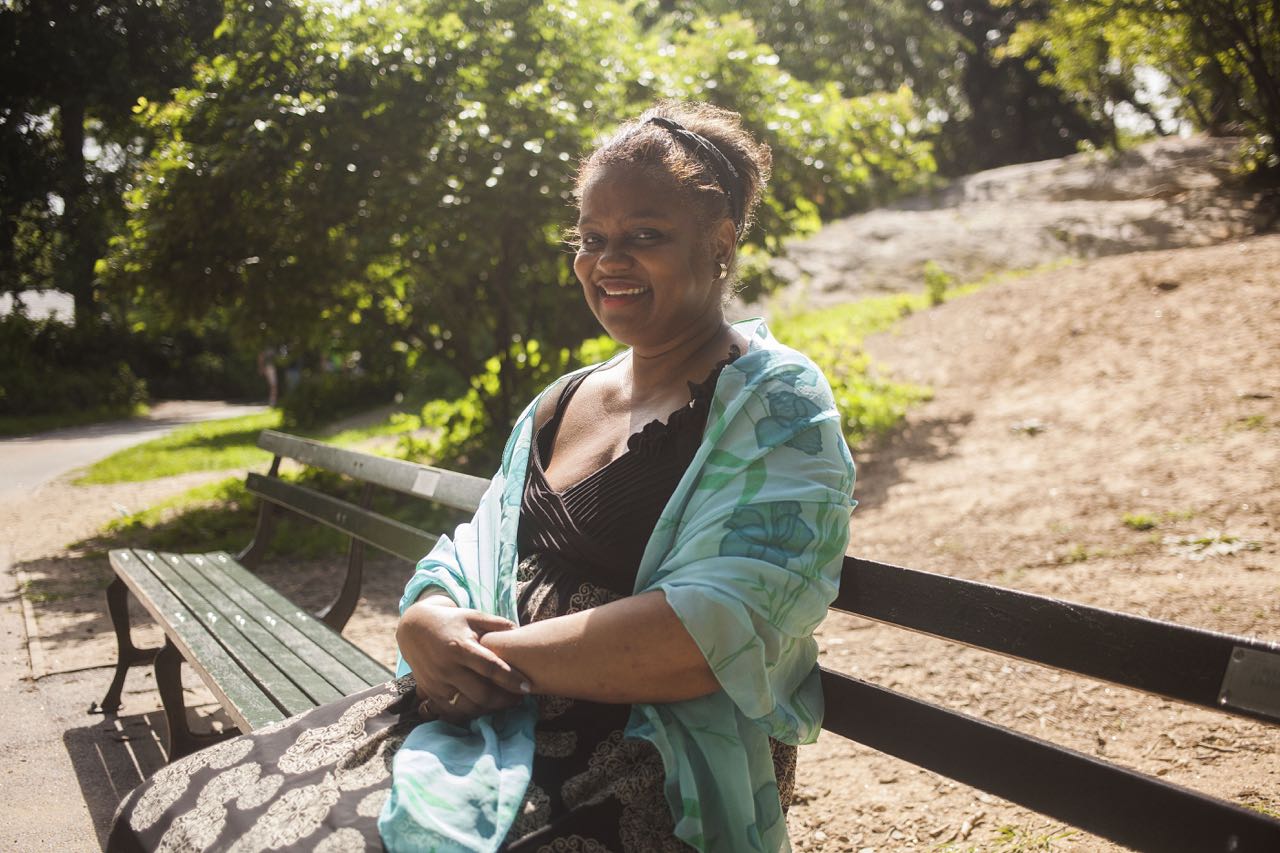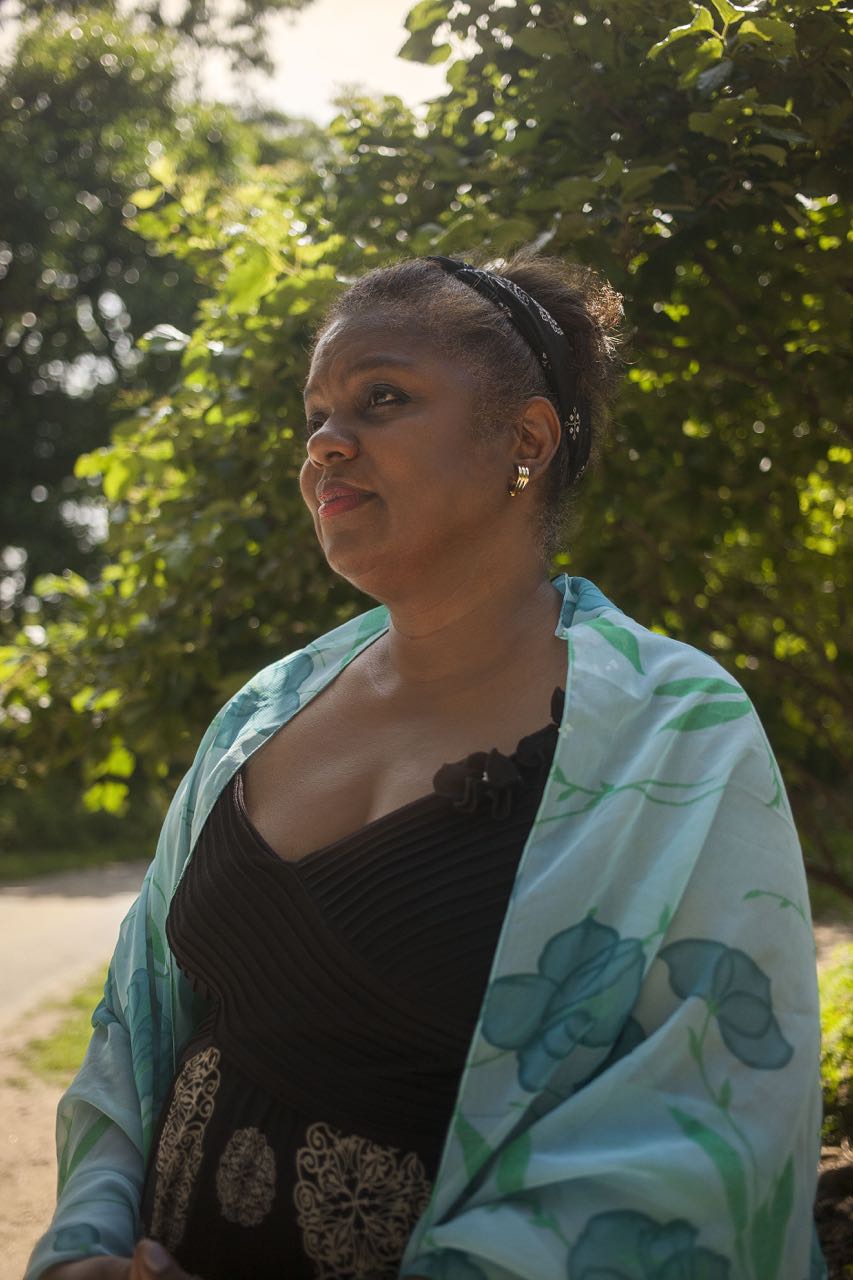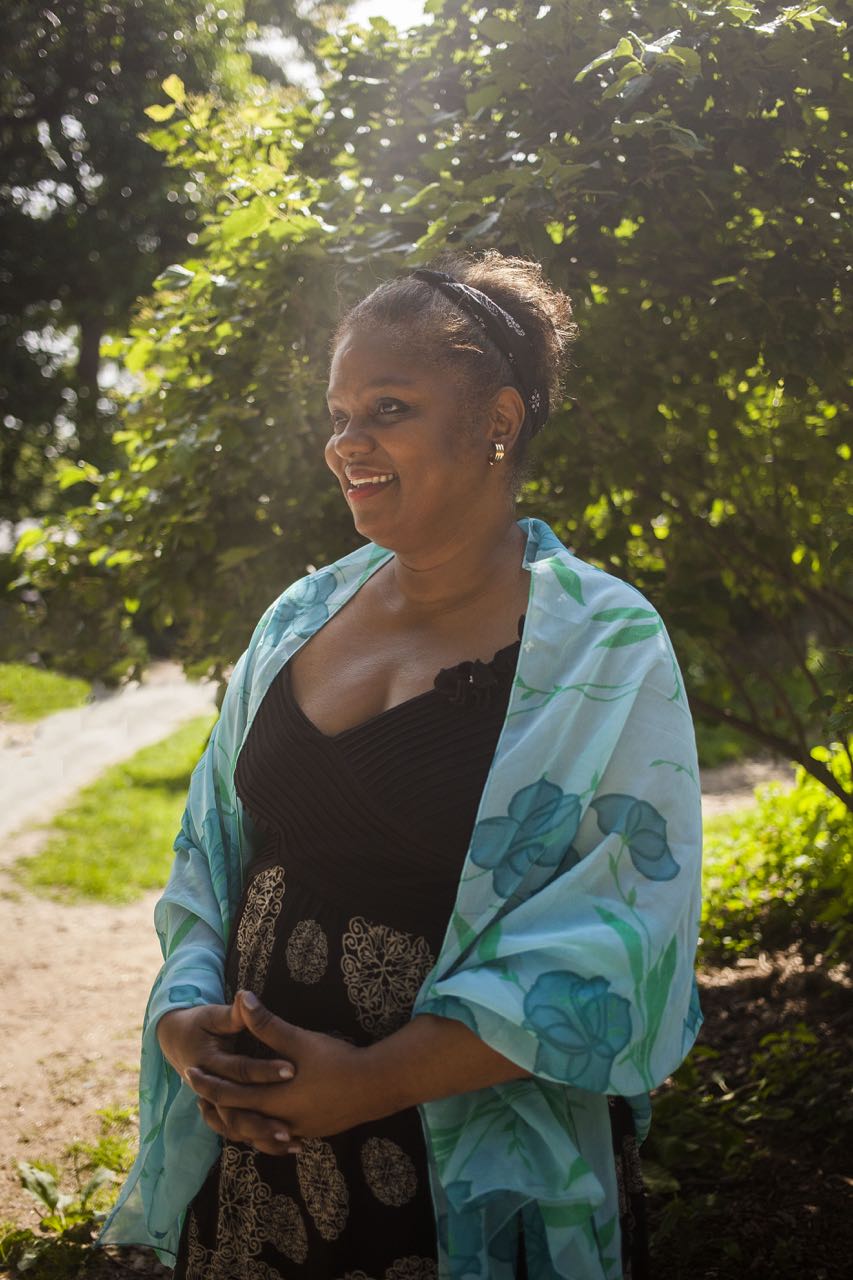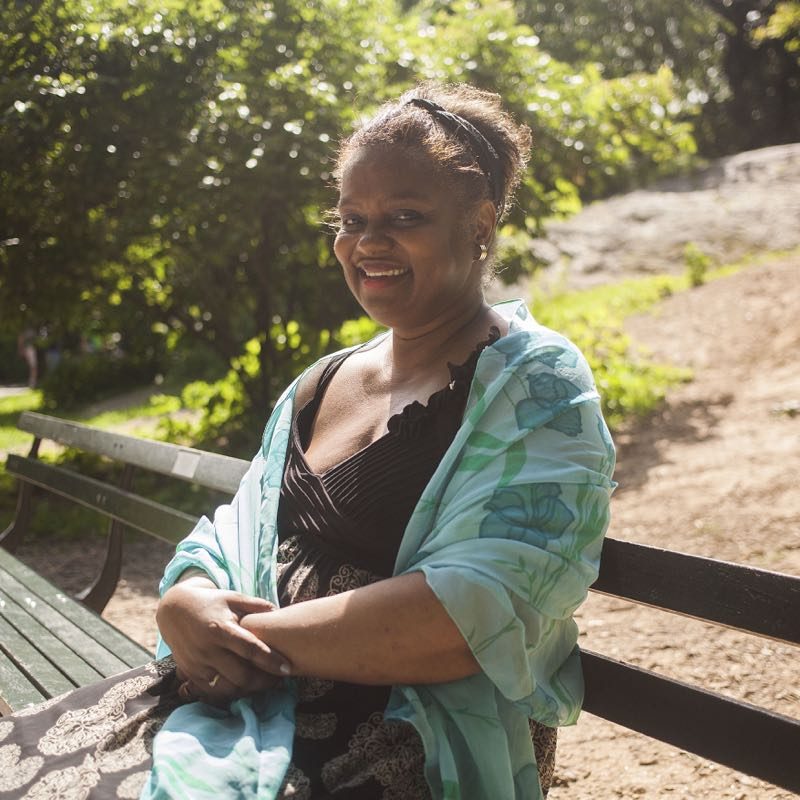An Interview with Kirsten Childs

Written by Victoria Myers
Photography by Marisa Chafetz
July 11th, 2017
This is a good summer for the work of composer, lyricist, and book writer Kirsten Childs. At the start of the summer her musical Bella: An American Tall Tale had it’s New York premiere at Playwrights Horizons, and in a few weeks her cult hit musical The Bubbly Black Girl Sheds Her Chameleon Skin will be revived as part of Encores! Off-Center. When Bubbly Black Girl, her first major musical, premiered in 2000 (also at Playwrights Horizons), it earned Kirsten a host of musical theatre writing awards, including an Obie for Best Music and Lyrics and a Kleban Award. Kirsten began her career as a performer and shifted to writing by teaching herself, and is now one of the few women working in musical theatre to write the music, lyrics, and book. She also teaches at NYU’s Graduate Musical Theatre Writing program, where she made a major influence on one of The Interval’s contributors. We recently sat down with Kirsten to discuss Bella, how her writing process has evolved, what it means for Bubbly Black Girl to be revived in 2017, and more.
I wanted to start by talking about your writing process. For you, what is your process like between having an idea in your brain and then being like, “Oh, this should be a musical”?
They just sort of jump out at me. For example, with Bella, in the Playbill I talk about the genesis of it. I was walking down the street and I saw this couple, and the woman had a very big behind, and the men that were walking past her were totally enraptured by her big behind—like every single guy. It was just fascinating to me. I started to slow down and watch this, and the thing that I got from it was that what people are saying is attractive about a woman’s body is not always what is attractive about a woman’s body. We could talk about objectification, but the main thing is a phenomenon happened and I bore witness to it. And I thought, “I have to do something about this. I have to talk about this woman who was an iconic beauty figure that most people are saying, ‘Ugh, her butt’s too big.'” So I knew that that was something that I really wanted to explore in a musical theatre format. Once I decided she was larger than life and it would be a tall tale, all bets were off. I knew I had to explore the old west with some funk.
When you sit down and write, do you write in order or do you write the first image that’s really strong to you?
I used to be a performer and I had an acting teacher who had this technique where he talked about the waiting game, and how when something is so strong that it has to come out, then it will come out. You have to trust that it’s going to come out; you can’t force it. And so, since that was such a strong moment and it was such a strong image, I don’t even remember how I started, but it just started to pour out of me and I trusted my instincts.
I didn’t study music theory in college or anything like that. In fact, my brother is a composer and I was the lyricist for him. We had our roles and so I never strayed from that role. But how I used to work with him was that I would give him some lyrics and he would say, “Well, how do you hear them?” And I would sing a melody, and then he would get from that melody what I was going for, and then he would write his own music. I never clocked that what I was doing was actually composing until much later when I was frustrated with nobody hearing the music that I could hear in my head, and someone saying, “Well why don’t you just write it down?” And I figured out a way to write it down. So I already was a lyricist and a book writer, and once I had the realization that I was also a composer, I formed the story using any of those forms when it was right for me to do it. In other words, I might write the lyrics first or I might write the music, and then start going back and forth. But the bottom line is, it was something that would spring up in me.
With Bella, I was wondering if you would talk a little bit more about how you developed the form for it in terms of the Wild West narrative that is the framework for the rest of it.
I knew that Bella was going to go on a journey. That was the foundation of what the musical was going to be. I started to do research about people of color in the old west because apparently we didn’t exist [there], and I knew that couldn’t be right, so I went to libraries and I listened to podcasts of professors talking about that period in history, and there were so many fascinating characters that I knew she was going to meet a whole bunch of different characters on whatever journey she was going to take. So I knew that it was going to be a journey, I knew there were going to be these fascinating characters that she was going to meet, but I didn’t know the meat and potatoes of what her story was. I just knew that she had to face some serious obstacles. As I did different workshops of it and different drafts, the story began to become clear. I knew she was on a journey to get to her Buffalo soldier sweetheart. Originally, she was going to get to him and it was going to be a happy ending that way. And then, as I started to deal with the obstacles that a young black woman would face in 19th-century America, it became evident to me that perhaps there would be a problem with her actually ending up with him. Things started to scare me and I thought, “Oh, that’s a good thing.” Then I started to work with Robert O’Hara, who is the director for the piece, and he asked me some tough questions and I had to answer them.
Can you talk a little bit more about that?
He asked, “Why is she going on this journey?” and, “Why is she meeting these people? And what is she running from? And what are her obstacles?” He just kept pushing me and pushing me, and I realized that part of her journey was the initial thing that attracted me to that moment when I was walking down the street watching that couple: the advantage and disadvantage of her big behind and what that would do, and the objectification, and also the pure delight in the beauty of her figure. And so, the issues that she has to grapple with in the story deal directly with those things. Also there was a moment I put in there, which just felt right, where she has to deal with her mother and her grandmother. She leaves them behind back in Mississippi, which is where she’s from, and the grandmother is a griot, an oral historian in African tradition. The tale that is told about black people in this country is a tall tale. It’s a tall tale that is suited to the people who are telling the history of this country. There are other narratives, and one of the ways that black people get the narrative of who they are is from the oral historians. So I put in this grandmother who knew of her ancestors back in Africa, but she’s suffering from dementia. I felt like that was a big metaphor for who we are as black people in this country, that we are suffering from a loss of memory of who we are. It’s a matriarchy too, because of the history of the way that the black men and women were separated in this country, it necessitated the strength of black women, and I wanted to explore that too. And so things started to come out, and they were scary and really important for me to explore.
How did you use the form to help explain the themes you were writing about?
The funny thing about it is I actually think I’m writing a traditional musical, but everybody’s telling me that it’s doing all of these other things. I found the 11 o’clock number, I found the “I want” song. I really approached it in what I thought was a very traditional way, and apparently it’s not. So I really couldn’t tell you how I developed the form, beyond saying that I wanted to do a traditional musical, and I thought I was doing one.
Why do you think that disconnect is there?
I think traditional musicals about African Americans are not this kind of story. As a matter of fact, why I started writing musicals was because I was in a show called The Boys from Syracuse, which is based on The Comedy of Errors, and it was the all black version. Back in the day, most of the time that African Americans did shows on Broadway or Off-Broadway, they were either the all black version of a show that was created for white people; the token black person in a pretty much all white musical; or revues, so they had no book, and they had a bunch of songs that were sort of strung together. I think those kinds of shows are what are in people’s heads, especially the musical revues, as what a traditional musical for African Americans is, and there are just these preconceptions of what the musical should be. I thought, “Well, I’m going to write something like Carousel, where people are happy and sad and sing fun songs and have obstacles to face.” I really think that’s what I’ve done. So I don’t know, beyond that people maybe just haven’t seen black people in that situation before, so they think that it’s something unusual. But if you really look at it, it’s constructed pretty much like a traditional musical.
Writing about women and their physical appearance seems like a very loaded topic. How did you work on that? Was that one of the things that felt scary?
It didn’t feel scary at all.
Oh, really?
I grew up in a time where people didn’t have as many rights, and so you learned to work around a lot of stuff, and I’m really happy that people are not taking shit anymore. But I guess I’m from a time where you just dare, and then somebody says, “No, you can’t do that.” I just encourage people to go as far as they go and be as obnoxious and offensive [as they want], and then sort of whittle away and see what you have. And let’s be honest, women get objectified. I’m a little bit older now, and so I watched this woman walking down the street, and she was young and she was beautiful, and these guys were on the same side of the street and she purposely walked onto the other side of the street. And I was like, “Oh, thank god.” But that happens. And so to not want to look at it, I think is derelict in the duty of who we are as artists. To turn it on its ear is an obligation for me. To poke holes at it, to poke fun at it, to make people think differently about it, that’s my purpose. That was my purpose in doing Bella.

I want to go back to something you said at the very beginning, when you were talking about when you first started thinking of yourself as a composer. Did you find that you had to change how you thought about constructing a musical? It seems like it’s a different thing, doing the book, lyrics, and music, rather than the collaborative part of just doing one or two of those.
Ever since I was a little kid, I have been stubborn. I’ve always been a little bubbly and like, “Oh, please,” but deep down inside I’ve been like, “I can do any damn thing I want.” And if I don’t have the tools to do it, I’m going to figure out other tools to help me do it. So once I started to realize that I could actually write the music, it was really exciting. It was like, “How do I make this puzzle work?” There was just nothing about it that was daunting to me. I love musicals so much, it was just the most wonderful challenge to try and figure out how to make this work. I just knew someday, some way, I was going to crack it, and if I didn’t crack it in the traditional way, I was going to crack it in my own way. Because I just know what makes me want to get up and dance and sing along, and I know I have a true compass for that. So it was always trying to figure out the puzzle, and just having faith that I would.
When I first started composing, since I didn’t know how to notate, I would take a boom box—because they didn’t have mp3s then—and another boom box, and I would put a tape in the boom box and I would hit record, and then I would sing a melody. Then I’d take another tape, and I would put it in the other boom box, hit record on this one, hit play, and sing along with myself on a harmonizing line. And then do that back and forth and back and forth until I had the sound that I wanted to hear. It had a lot of tape hiss, but it was a song. And I went to a little downtown spoken word place and sang a couple of songs, and people really connected with them. The guy that was my musical director said, “You’re going to learn how to notate.” And he said, “Some people might read your mind, but it’s better if they read your music.” I went to a music store down near Astor Place that’s now a gym, and I bought a little book that was actually how to play piano, not how to write, and I learned what the time signature was, how to do the quarter note and the half note and everything, and then the Finale program came along. So on the job I’ve been learning. My musical directors have helped me with theory things, and I’ve just been open to it. I’m just not letting anything stop me.
There aren’t that many female composers working in theatre, and a lot of women who are writers and directors have to work extra hard to be taken seriously. Was there ever worry about people not taking you seriously as you were trying to learn how to do this?
Here’s the thing. I used to be a dancer. I don’t know how it is now, but they were the lowest person on the totem pole in terms of how people used to treat them. I hope it’s different now. But I was so dismissed when I was a dancer. I became an actor—even more dismissed. And none of it stopped me from the deep belief that I had in myself. When I started to write, people would say things. Those little code words like ambitious. Like, “Oh, that’s very ambitious of you.” And I knew that meant, “Don’t go there. This is not for you.” But as I said, from childhood, I’m stubborn, and I also know that I’m good. Even when I was bad, I knew I had the potential to be good, and so anytime somebody said something like that, my back would go up. Even if I was smiling sweetly, my back would go up and say, “I’ll show you.” I always had faith in myself that I had something. Whether or not it was the greatest thing, I had something, and this other person who was saying something, they were just words that they needed to say for whatever reason, and all it did was make me get mad and make me go, “I’m going to show you.”
I took a gamble, and I think I won in that I know now that I am a writer and I’m a good writer. I think we’re always worried, “Is this the best I could do?” And when you have those moments when you’re working on something, and you know in your heart that even if it isn’t good for somebody else it’s good for you, I think that’s all you can do. But I know that there are a lot of people who struggle with that, and I think women struggle with it a lot more because of the restrictions that are put on them and the restrictions that they put on themselves, because if you break out of that mold, you may be seen as pushy or too not-womanly. There are all these things that people go through, but you have to just brave it. It’s very frightening, but as I said before, if it’s frightening then you got to do it.
I want to make sure we talk a little bit about Encores because that’s coming up. What’s it been like for you to go back and revisit The Bubbly Black Girl, especially coming right off of Bella?
In between Bella at Dallas Theatre Center and Bella at Playwrights, The Bubbly Black Girl was done in London at Theatre Royal Stratford East. It was really interesting, because their cultural references are completely different, so I had to explain who Harriet Tubman was because there’s a reference to her. But what was interesting about it is that it, sadly, still has relevance today, because the issues that Bubbly is grappling with—racism and things like racial profiling and all sorts of issues—are still currently happening. I’m really curious to see what it’s going to play like in 2017, because in 2000 the issues were just as current, but people just didn’t want to look at them. People are much more willing to hear and to deal with issues that people just didn’t even want to act like they existed back then. I’m really excited to see how people are going to react to Bubbly. She’s also dealing with being an outsider. When I did Bubbly originally, I did it as a performance piece, and after one performance this young Asian man came up to me and said, “This is my story.” There’s a universality of not feeling like you’re a part of the group that you’re supposed to be a part of because you don’t hold to all of the things that you’re supposed to hold to in that particular group. I think it goes for race, I think it goes for gender, I think it goes for all sorts of -isms that you’re part of, but there are certain little things where you’re like, “I don’t know if I buy into that particular -ism that everybody feels is right for my group.” There are all sorts of different ‘others’ now, so I’m curious to see it.

On a personal level, what’s it been like going back? Leaving issues in politics aside, just on a very internal level of you as a writer and as a person who has changed in the last 17 years?
It’s hard to come back to Bubbly because I’m no longer even close to that person, and it’s hard to come back because I go, “Oh, really? Was I like that?” But on the other hand, what’s good about coming back to the story is that I now have distance enough to go, “Oh, that can go and that can go and that can go.” I can actually look at the piece and see what I can do to shape it. The advantage of having many more years than I had back then gives me more objectivity in terms of, this is an actual musical that I need to work on.
I do think that it’s a little bit of a shame that it’s taken 17 years for it to come back into the notice of the public, and I do think that it is a shame that musicals by women of color, by women, by people who are not white men, are not, in my opinion, as available to the public as they should be. I think that that’s actually a loss to the theatre. It’s a big loss to the theatre, and I’m hoping that it will change because at NYU [where I teach] I see a plethora of incredible musicals by a whole bunch of diverse people with diverse voices, and I think that the musical theatre needs some new blood or it will become anemic and then it will die. And we don’t want that, do we?
What do you think is the best thing to do to change that?
I think it’s an all-out on all fronts. I think that we need the writers, we need the producers, we need the casting directors, we need everybody in every part of the musical theatre to embrace diversity. And we need the actual theatres. Just every aspect of it. And then people need to encourage each other to come to the theatre because we need the audiences. We need the audiences of color, we need young people, we need older people, we need everybody. I think then you will see such a renaissance of incredible musical theatre.
Do you have something in your head that’s a very practical thing that you think people could go out and do to help all that?
I think just expressing it, and then enterprising people going, “Yeah [I’m going to do something].” When I started writing musicals, I was doing The Boys from Syracuse and these people were incredible actors and I thought, “Well I could complain about it or I could just start writing a musical.” And that’s what I did. And I think that people have to. I can’t make people do anything more than they want to do, but I do feel that there are people out there who, maybe if they read this interview, they’ll go, “Yeah, I should be a producer. Yeah, I should be a casting director. I should do this, I should do that,” and nothing’s stopping you but you.

